Lesson 45 Different Manners 课件(共27张PPT)
文档属性
| 名称 | Lesson 45 Different Manners 课件(共27张PPT) | 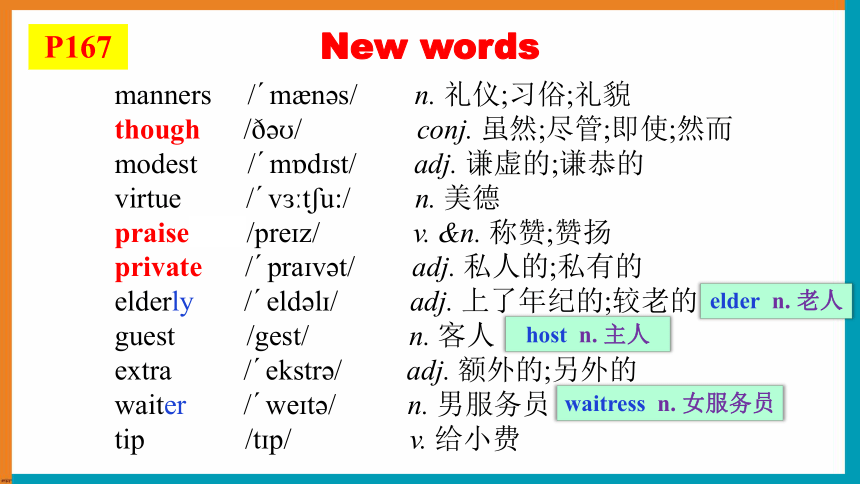 | |
| 格式 | zip | ||
| 文件大小 | 4.1MB | ||
| 资源类型 | 教案 | ||
| 版本资源 | 冀教版 | ||
| 科目 | 英语 | ||
| 更新时间 | 2023-01-27 22:26:19 | ||
图片预览

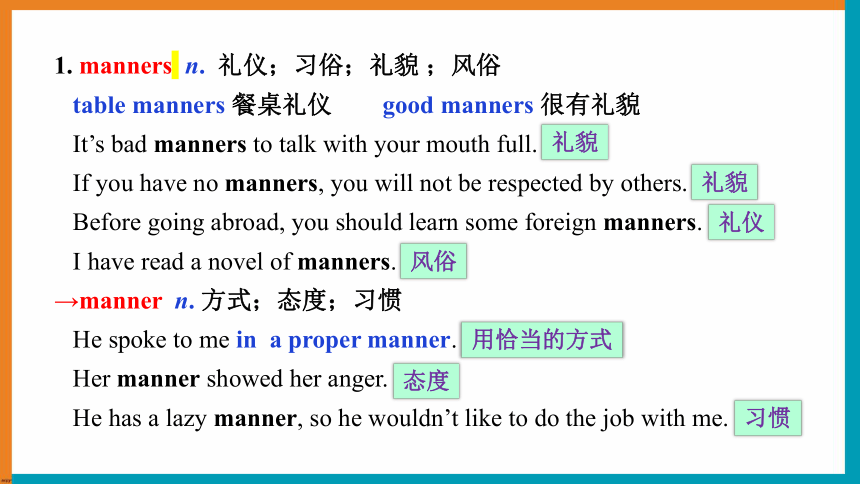
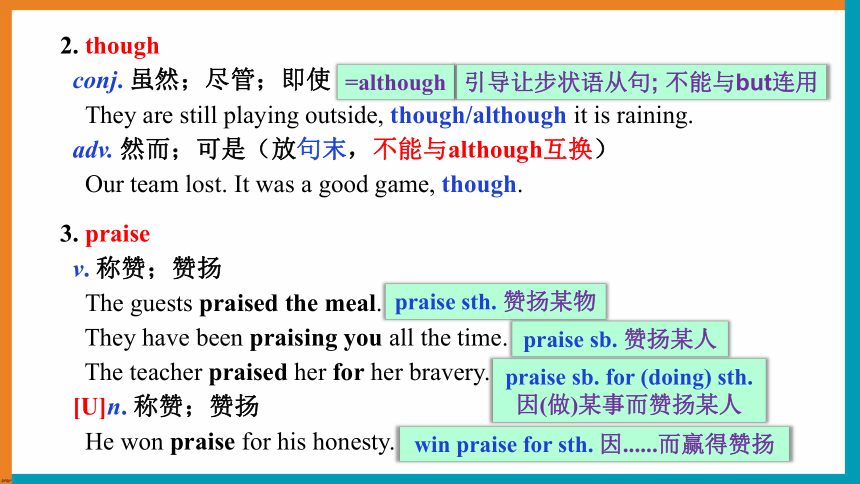
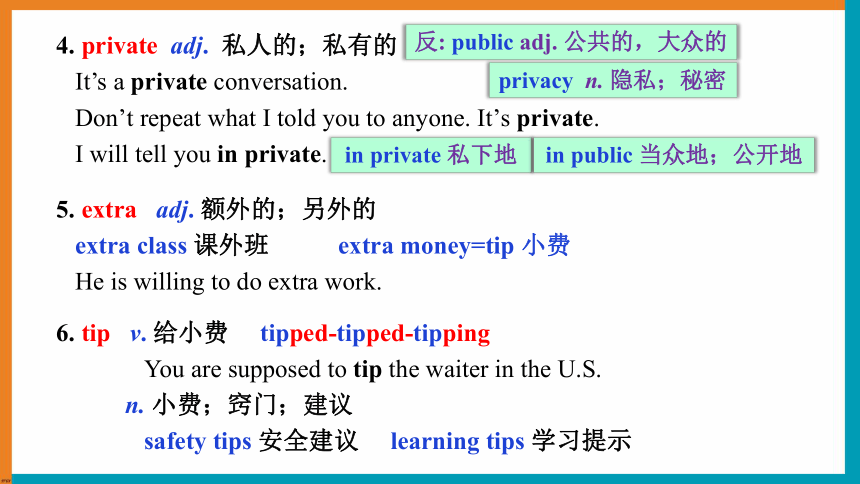

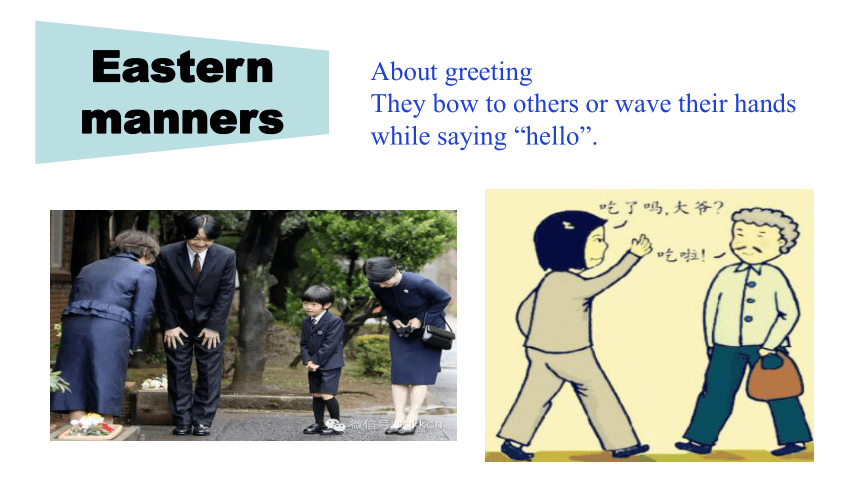
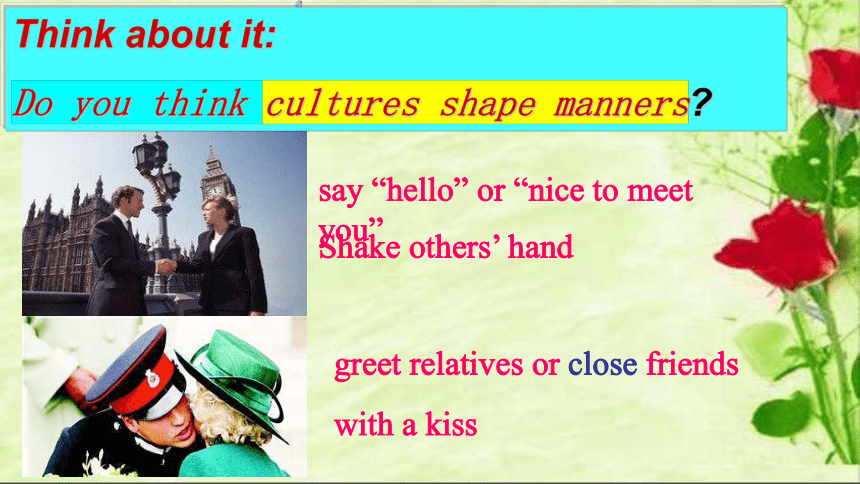
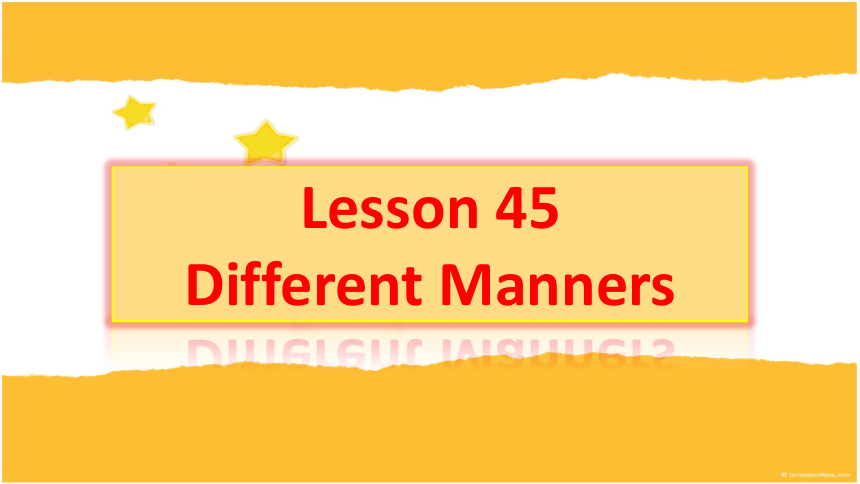
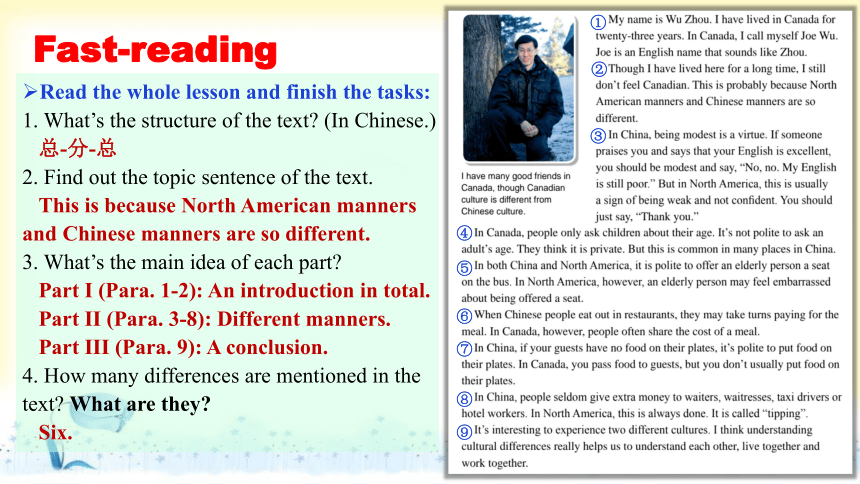
文档简介
(共27张PPT)
manners / m n s/ n. 礼仪;习俗;礼貌
though / / conj. 虽然;尽管;即使;然而
modest / m d st/ adj. 谦虚的;谦恭的
virtue / v t u:/ n. 美德
praise /pre z/ v. &n. 称赞;赞扬
private / pra v t/ adj. 私人的;私有的
elderly / eld l / adj. 上了年纪的;较老的
guest /gest/ n. 客人
extra / ekstr / adj. 额外的;另外的
waiter / we t / n. 男服务员
tip /t p/ v. 给小费
New words
host n. 主人
elder n. 老人
waitress n. 女服务员
P167
1. manners n. 礼仪;习俗;礼貌 ;风俗
table manners 餐桌礼仪 good manners 很有礼貌
It’s bad manners to talk with your mouth full.
If you have no manners, you will not be respected by others.
Before going abroad, you should learn some foreign manners.
I have read a novel of manners.
→manner n. 方式;态度;习惯
He spoke to me in a proper manner.
Her manner showed her anger.
He has a lazy manner, so he wouldn’t like to do the job with me.
礼貌
礼貌
礼仪
风俗
用恰当的方式
态度
习惯
2. though
conj. 虽然;尽管;即使
They are still playing outside, though/although it is raining.
adv. 然而;可是(放句末,不能与although互换)
Our team lost. It was a good game, though.
3. praise
v. 称赞;赞扬
The guests praised the meal.
They have been praising you all the time.
The teacher praised her for her bravery.
[U]n. 称赞;赞扬
He won praise for his honesty.
引导让步状语从句; 不能与but连用
=although
win praise for sth. 因......而赢得赞扬
praise sb. for (doing) sth.
因(做)某事而赞扬某人
praise sth. 赞扬某物
praise sb. 赞扬某人
4. private adj. 私人的;私有的
It’s a private conversation.
Don’t repeat what I told you to anyone. It’s private.
I will tell you in private.
5. extra adj. 额外的;另外的
extra class 课外班 extra money=tip 小费
He is willing to do extra work.
6. tip v. 给小费 tipped-tipped-tipping
You are supposed to tip the waiter in the U.S.
n. 小费;窍门;建议
safety tips 安全建议 learning tips 学习提示
反: public adj. 公共的,大众的
in private 私下地
in public 当众地;公开地
privacy n. 隐私;秘密
Enjoy a video about greeting in different countries
Eastern manners
About greeting
They bow to others or wave their hands while saying “hello”.
western manners
meet for the first time
say “hello” or “nice to meet you”
Shake others’ hand
greet relatives or close friends
with a kiss
Think about it:
Do you think cultures shape manners
Lesson 45
Different Manners
Fast-reading
Read the whole lesson and finish the tasks:
1. What’s the structure of the text (In Chinese.)
总-分-总
2. Find out the topic sentence of the text.
This is because North American manners and Chinese manners are so different.
3. What’s the main idea of each part
Part I (Para. 1-2): An introduction in total.
Part II (Para. 3-8): Different manners.
Part III (Para. 9): A conclusion.
4. How many differences are mentioned in the text What are they
Six.
①
②
③
④
⑤
⑥
⑦
⑧
⑨
Careful-reading
Different manners in China and North America
Differences In China In North America
Being modest
a virtue
a sign of being weak and not confident
Asking an adult’s age
Offering an elderly person a seat
Eating out in restaurant
putting food on guests’ plates
Tipping
Careful-reading: Para. 3
Careful-reading
Different manners in China and North America
Differences In China In North America
Being modest
a virtue
a sign of being weak and not confident
Asking an adult’s age
common
not polite
Offering an elderly person a seat
Eating out in restaurant
putting food on guests’ plates
Tipping
Careful-reading: Para. 4
It’s polite to do sth. 做某事是礼貌的。
It’s not polite to do sth.
Careful-reading
Different manners in China and North America
Differences In China In North America
Being modest
a virtue
a sign of being weak and not confident
Asking an adult’s age
common
not polite
Offering an elderly person a seat
polite
polite, but the elderly person may feel embarrassed
Eating out in restaurant
putting food on guests’ plates
Tipping
Careful-reading: Para. 5
offer sb. sth. =offer sth. to sb.
为某人提供某物
Careful-reading
Different manners in China and North America
Differences In China In North America
Being modest
a virtue
a sign of being weak and not confident
Asking an adult’s age
common
not polite
Offering an elderly person a seat
polite
polite, but the elderly person may feel embarrassed
Eating out in restaurant
take turns paying for the meal
share the cost of a meal
putting food on guests’ plates
Tipping
Careful-reading: Para. 6
take turns doing sth. 轮流做某事
to do sth.
我们轮流做家务。
We take turns doing the housework.
=We take turns to do the housework.
n. 成本,花费
go Dutch AA制
It is one’s turn to do sth.
轮到某人做某事。
明天轮到我打扫教室。
It will be my turn to clean the classroom.
Careful-reading
Different manners in China and North America
Differences In China In North America
Being modest
a virtue
a sign of being weak and not confident
Asking an adult’s age
common
not polite
Offering an elderly person a seat
polite
polite, but the elderly person may feel embarrassed
Eating out in restaurant
take turns paying for the meal
share the cost of a meal
putting food on guests’ plates
polite
They seldom do so and they pass food.
Tipping
Careful-reading: Para. 7
Careful-reading
Different manners in China and North America
Differences In China In North America
Being modest
a virtue
a sign of being weak and not confident
Asking an adult’s age
common
not polite
Offering an elderly person a seat
polite
polite, but the elderly person may feel embarrassed
Eating out in restaurant
take turns paying for the meal
share the cost of a meal
putting food on guests’ plates
polite
They seldom do so and they pass food.
Tipping
seldom give extra money
always give extra money
Careful-reading: Para. 8
extra money=tip 小费
give extra money=tip 给小费
Read the passage and match the behaviours with the correct countries.
China
Canada
asking an adult's age
putting food on a guest’s plate
giving a tip to waiters and hotel
workers
sharing the cost of a meal in a
restaurant
Para. 1&2
Although people have different cultures and customs,
but he has already made many friends there.
Brain hasn’t been to China,
they have the same feelings.
He has been at the new school for only a few days,
he still feels lonely.
Though Liu Feng has many friends in America,
but he knows a lot about our country.
Match and complete the sentences.
Para. 9
Different countries have different manners. Why should we understand cultural differences
Fill in the blanks with the words or phrases in the box.
1. We should _______ little Debbie for her courage.
2. It’s a long way. We can __________ driving.
3. They asked him to ________the damage, but he refused.
4. Don’t talk about other people’s ________ things. It’s not polite.
5. Jack is a ________ man who is admired by many people.
praise
take turns
pay for praise take turns modest private
pay for
private
modest
manners / m n s/ n. 礼仪;习俗;礼貌
though / / conj. 虽然;尽管;即使;然而
modest / m d st/ adj. 谦虚的;谦恭的
virtue / v t u:/ n. 美德
praise /pre z/ v. &n. 称赞;赞扬
private / pra v t/ adj. 私人的;私有的
elderly / eld l / adj. 上了年纪的;较老的
guest /gest/ n. 客人
extra / ekstr / adj. 额外的;另外的
waiter / we t / n. 男服务员
tip /t p/ v. 给小费
New words
host n. 主人
elder n. 老人
waitress n. 女服务员
P167
1. manners n. 礼仪;习俗;礼貌 ;风俗
table manners 餐桌礼仪 good manners 很有礼貌
It’s bad manners to talk with your mouth full.
If you have no manners, you will not be respected by others.
Before going abroad, you should learn some foreign manners.
I have read a novel of manners.
→manner n. 方式;态度;习惯
He spoke to me in a proper manner.
Her manner showed her anger.
He has a lazy manner, so he wouldn’t like to do the job with me.
礼貌
礼貌
礼仪
风俗
用恰当的方式
态度
习惯
2. though
conj. 虽然;尽管;即使
They are still playing outside, though/although it is raining.
adv. 然而;可是(放句末,不能与although互换)
Our team lost. It was a good game, though.
3. praise
v. 称赞;赞扬
The guests praised the meal.
They have been praising you all the time.
The teacher praised her for her bravery.
[U]n. 称赞;赞扬
He won praise for his honesty.
引导让步状语从句; 不能与but连用
=although
win praise for sth. 因......而赢得赞扬
praise sb. for (doing) sth.
因(做)某事而赞扬某人
praise sth. 赞扬某物
praise sb. 赞扬某人
4. private adj. 私人的;私有的
It’s a private conversation.
Don’t repeat what I told you to anyone. It’s private.
I will tell you in private.
5. extra adj. 额外的;另外的
extra class 课外班 extra money=tip 小费
He is willing to do extra work.
6. tip v. 给小费 tipped-tipped-tipping
You are supposed to tip the waiter in the U.S.
n. 小费;窍门;建议
safety tips 安全建议 learning tips 学习提示
反: public adj. 公共的,大众的
in private 私下地
in public 当众地;公开地
privacy n. 隐私;秘密
Enjoy a video about greeting in different countries
Eastern manners
About greeting
They bow to others or wave their hands while saying “hello”.
western manners
meet for the first time
say “hello” or “nice to meet you”
Shake others’ hand
greet relatives or close friends
with a kiss
Think about it:
Do you think cultures shape manners
Lesson 45
Different Manners
Fast-reading
Read the whole lesson and finish the tasks:
1. What’s the structure of the text (In Chinese.)
总-分-总
2. Find out the topic sentence of the text.
This is because North American manners and Chinese manners are so different.
3. What’s the main idea of each part
Part I (Para. 1-2): An introduction in total.
Part II (Para. 3-8): Different manners.
Part III (Para. 9): A conclusion.
4. How many differences are mentioned in the text What are they
Six.
①
②
③
④
⑤
⑥
⑦
⑧
⑨
Careful-reading
Different manners in China and North America
Differences In China In North America
Being modest
a virtue
a sign of being weak and not confident
Asking an adult’s age
Offering an elderly person a seat
Eating out in restaurant
putting food on guests’ plates
Tipping
Careful-reading: Para. 3
Careful-reading
Different manners in China and North America
Differences In China In North America
Being modest
a virtue
a sign of being weak and not confident
Asking an adult’s age
common
not polite
Offering an elderly person a seat
Eating out in restaurant
putting food on guests’ plates
Tipping
Careful-reading: Para. 4
It’s polite to do sth. 做某事是礼貌的。
It’s not polite to do sth.
Careful-reading
Different manners in China and North America
Differences In China In North America
Being modest
a virtue
a sign of being weak and not confident
Asking an adult’s age
common
not polite
Offering an elderly person a seat
polite
polite, but the elderly person may feel embarrassed
Eating out in restaurant
putting food on guests’ plates
Tipping
Careful-reading: Para. 5
offer sb. sth. =offer sth. to sb.
为某人提供某物
Careful-reading
Different manners in China and North America
Differences In China In North America
Being modest
a virtue
a sign of being weak and not confident
Asking an adult’s age
common
not polite
Offering an elderly person a seat
polite
polite, but the elderly person may feel embarrassed
Eating out in restaurant
take turns paying for the meal
share the cost of a meal
putting food on guests’ plates
Tipping
Careful-reading: Para. 6
take turns doing sth. 轮流做某事
to do sth.
我们轮流做家务。
We take turns doing the housework.
=We take turns to do the housework.
n. 成本,花费
go Dutch AA制
It is one’s turn to do sth.
轮到某人做某事。
明天轮到我打扫教室。
It will be my turn to clean the classroom.
Careful-reading
Different manners in China and North America
Differences In China In North America
Being modest
a virtue
a sign of being weak and not confident
Asking an adult’s age
common
not polite
Offering an elderly person a seat
polite
polite, but the elderly person may feel embarrassed
Eating out in restaurant
take turns paying for the meal
share the cost of a meal
putting food on guests’ plates
polite
They seldom do so and they pass food.
Tipping
Careful-reading: Para. 7
Careful-reading
Different manners in China and North America
Differences In China In North America
Being modest
a virtue
a sign of being weak and not confident
Asking an adult’s age
common
not polite
Offering an elderly person a seat
polite
polite, but the elderly person may feel embarrassed
Eating out in restaurant
take turns paying for the meal
share the cost of a meal
putting food on guests’ plates
polite
They seldom do so and they pass food.
Tipping
seldom give extra money
always give extra money
Careful-reading: Para. 8
extra money=tip 小费
give extra money=tip 给小费
Read the passage and match the behaviours with the correct countries.
China
Canada
asking an adult's age
putting food on a guest’s plate
giving a tip to waiters and hotel
workers
sharing the cost of a meal in a
restaurant
Para. 1&2
Although people have different cultures and customs,
but he has already made many friends there.
Brain hasn’t been to China,
they have the same feelings.
He has been at the new school for only a few days,
he still feels lonely.
Though Liu Feng has many friends in America,
but he knows a lot about our country.
Match and complete the sentences.
Para. 9
Different countries have different manners. Why should we understand cultural differences
Fill in the blanks with the words or phrases in the box.
1. We should _______ little Debbie for her courage.
2. It’s a long way. We can __________ driving.
3. They asked him to ________the damage, but he refused.
4. Don’t talk about other people’s ________ things. It’s not polite.
5. Jack is a ________ man who is admired by many people.
praise
take turns
pay for praise take turns modest private
pay for
private
modest
同课章节目录
- Unit 7 Work for Peace
- Lesson 37 Don't Fight!
- Lesson 38 Making School a Better Place
- Lesson 39 The Dove and the Olive Branch
- Lesson 40 The UN—Power of Words
- Lesson 41 Jenny's Good Advice
- Lesson 42 Peace at Last
- Unit Review
- Unit 8 Culture Shapes Us
- Lesson 43 A Visit to Chinatown
- Lesson 44 Popular Sayings
- Lesson 45 Different Manners
- Lesson 46 Home to Many Cultures
- Lesson 47 Good Manners
- Lesson 48 Supper with the Bradshaws
- Unit Review
- Unit 9 Communication
- Lesson 49 Get Along with Others
- Lesson 50 Tips for Good Communication
- Lesson 51 What Could Be Wrong?
- Lesson 52 The Power of a Smile
- Lesson 53 Working in Groups
- Lesson 54 How Embarrassing!
- Unit Review
- Unit 10 Get Ready for the Future
- Lesson 55 Look into the Future
- Lesson 56 Manage Your Time
- Lesson 57 Best Wishes
- Lesson 58 Ms.Liu's Speech
- Lesson 59 Keep Your Choices Open
- Lesson 60 Get a Good Education
- Unit Review
